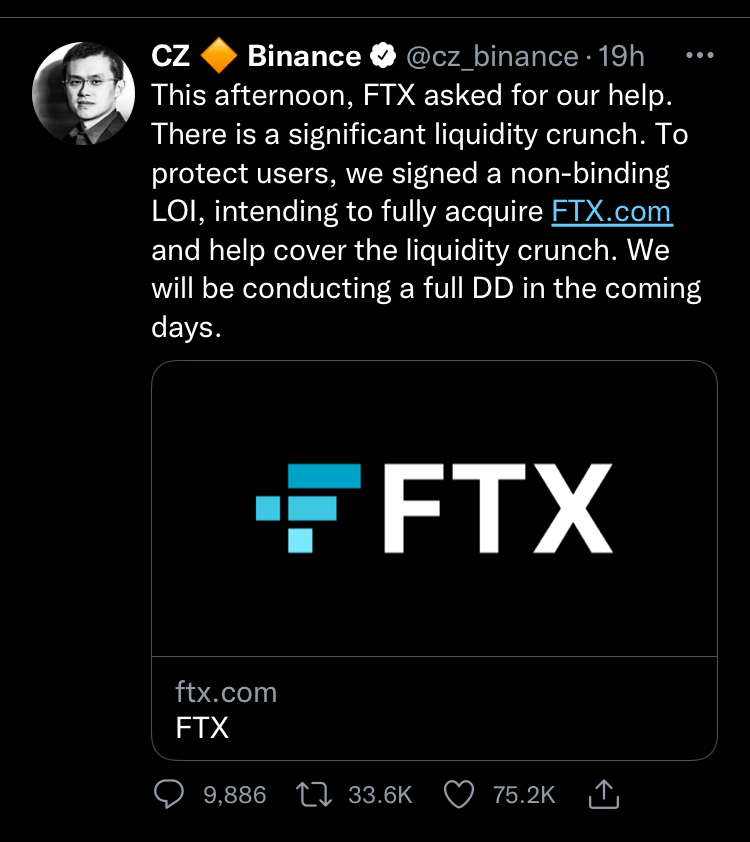FTX CEO Samuel Bankman-Fried announced the imminent acquisition, which he called a “strategic transaction,” to his Twitter followers early Tuesday.
“Things have come full circle, and FTX.com’s first, and last, investors are the same: we have come to an agreement on a strategic transaction with Binance for FTX.com (pending DD etc.),” he tweeted, referring to the deal’s due diligence legal process.
The acquisition plan follows reports earlier Tuesday that FTX had severely restricted customer withdrawals on its platform. FTX’s last outgoing transaction transpired at 6:37 a.m. ET Tuesday on the Ethereum blockchain, according to publicly available data from Etherscan. Withdrawal pauses have often served as the first distress flare from crypto firms signaling they are at risk of bankruptcy.
Binance and FTX’s tussle for dominance over the digital asset market came to an end this week when the companies’ leaders got into a Twitter spat over Binance’s market-moving decision to liquidate FTX’s native cryptocurrency token.
Binance CEO Changpeng Zhao tweeted “This afternoon, FTX asked for our help. There is a significant liquidity crunch. To protect users, we signed a non-binding LOI, intending to fully acquire FTX.com and help cover the liquidity crunch. We will be conducting a full DD in the coming days.”
“There is a lot to cover and will take some time. This is a highly dynamic situation, and we are assessing the situation in real time. Binance has the discretion to pull out from the deal at any time. We expect FTT to be highly volatile in the coming days as things develop.”
“Two big lessons:
1: Never use a token you created as collateral.
2: Don’t borrow if you run a crypto business. Don’t use capital “efficiently”. Have a large reserve.
Binance has never used BNB for collateral, and we have never taken on debt.
Stay #SAFU.🙏”
Binance CEO Changpeng Zhao tweeted Sunday that the company would liquidate all of its positions in FTX Token (FTT), a cryptocurrency token created by FTX, as part of Binance’s “risk management strategy.”
“Liquidating our FTT is just post-exit risk management, learning from LUNA,” tweeted Zhao, in a reference to the collapse of stablecoin TerraUSD, and its sister token, Luna, in May, which sent shockwaves through the cryptocurrency market.
Although Bankman-Fried was quick to deny allegations that FTX was facing a liquidity crisis, the market didn’t seem convinced.
The sudden surge in customer withdrawals began shortly after Zhao’s announcement, with on-chain analytics platforms reporting the exchange’s wallets were showing negative bitcoin balances.
Binance’s decision came after a CoinDesk report found that FTX sister company Alameda Research — also run by Bankman-Fried — holds much of its wealth in illiquid cryptocurrency assets like the FTT token, rather than an independent currency or coin. According to the report, as much as $5.82 billion of Alameda’s $14.6 billion of assets consisted of FTT tokens.
The acquisition by Binance is a surprising turn of events for FTX, a company that is well known for its own aggressive acquisition strategies. In late September, FTX won crypto broker Voyager Digital Ltd.’s assets with a $14.2-billion bid at auction. The winning bid was a milestone in FTX’s push to snap up struggling competitors amid a major downturn in the cryptocurrency market that has wiped out billions of dollars worth of digital value.
Bankman-Fried also explored investing in Twitter as billionaire Elon Musk sought to acquire the company for $44 billion in a move that was lauded by many in the crypto community. FTX ultimately passed, with Bankman-Fried citing a misalignment in the two platform’s visions for the future of the cryptocurrency industry. Binance, on the other hand, put up $500 million as an equity partner with Musk to buy Twitter.
Many crypto firms have been hit hard in this volatile cycle. In June, now-bankrupt crypto exchange Celsius announced it was pausing all user withdrawals due to “extreme market conditions.” A month later, the firm filed for Chapter 11 bankruptcy.
Similarly, in July, Voyager suspended all trading, deposit and withdrawal transactions on its platform. Then, just days later, it announced that it, too, would file for Chapter 11 bankruptcy.

